Worshipful publications bring enlightenment to diverse intellectual areas...
Elizabeth Consalvi
Assassination in London
 Trained in the Kremlin-supported youth activist camps to “break up fascist demonstrations and prevent with force any attempt to overthrow the constitution”; rewarded for thuggery and brutality; Alexei is seen to have promise, and is selected to continue his university education in London, UK
Trained in the Kremlin-supported youth activist camps to “break up fascist demonstrations and prevent with force any attempt to overthrow the constitution”; rewarded for thuggery and brutality; Alexei is seen to have promise, and is selected to continue his university education in London, UK
Among his obligations to the motherland are to undermine, on request, the business activities of “enemies of the state” living in London. He must also hold himself in readiness to perform a major service for his country, should this be required.
When he receives the word, he positions himself in a restaurant in Mayfair, to await the arrival of a visiting Russian dignitary...
________________________
Barry Curnow & John McLean Fox
http://www.amazon.co.uk/Books/s?ie=UTF8&field-author=Barry%20Curnow&page=1&rh=n%3A266239%2Cp_27%3A
.jpg)
Third Age Careers: Meeting the Corporate Challenge by Charles B. Handy, Barry Curnow, John McLean Fox and John (Chief Executive Future Perfect Fox McLean (15 Sep 1994)
This book focuses on Third Age Transition, that is to say making the change
from a mainstream career to other productive activities, whether commercial
social or personal. The topic is viewed from the corporate and individual
points of view, and points to the beneficial impact of someone moving to
portfolio career that consists of a number of disparate and satisfying
commitments. This is backed up by interesting case studies from Guinness,
Kleinwort Benson, Shell, BT, IBM, Ford, Marks and Spencer, and Portugal to
illustrate best practice at that time.
The Chance to Live More Than Once: Developing Future Lives and Careersby Barry Curnow and John McLean Fox (1 Nov 1996)
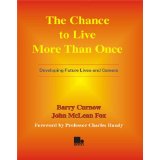
Following on from the previous book, this one focuses on the personal and
practical aspects of making a Third Age Transition. It provides the
methodology and supporting exercises that can lead to planning satisfying
activities in a person's Third Age. Personal examples are given for
individuals who have made some unusual transitions and found them to be
unexpectedly fulfilling.
______________________________________
Ian Daniell
.jpg)
Interim Management: The New Career Choice for Senior Managers by Dennis Russell and Ian Daniell (14 Aug 2005)
Although now a little dated, this book is a great reference work for anyone thinking of leaving corporate life and setting themselves up as an independent practitioner. It is also useful for anyone considering moving from pure consultancy to the more hands-on life of an interim manager.
_____________________________________________________
Claire Dyer
http://www.amazon.co.uk/s/ref=nb_sb_ss_i_1_8?url=search-alias%3Dstripbooks&field-keywords=claire+dyer&sprefix= Since demitting office as Clerk in late 2004, Claire has been pursuing a career as a novelist and poet. And she thought being Clerk of a Worshipful Company was tricky! However, in 2013 two amazing things happened. Firstly, Eleven Rooms, her first collection of poetry was published by Two Rivers Press, and secondly, her debut novel, The Moment, was published by Quercus. Her second novel, The Perfect Affair, will be forthcoming from Quercus in March 2014. As well as undertaking an MA in Poetry at Royal Holloway, University of London, Claire is also currently writing another novel.

Eleven Rooms explores contradictions inherent in ideas of the permanent. The poems hold on to what’s transient: a girl on the back of a boy’s motorbike – a moment with no start and no end, the exquisite pain of watching children grow up and away, the flex and flux of relationships, and what death takes from us.
‘There’s a clarity about Claire Dyer’s poems that makes them immediately attractive: their surfaces gleam and glitter. What makes them even more exceptional is the way this freshness connects to an underlying sense of the mystery and pathos of things – so that delight and sadness are always seen as inseparable. Which they are.’ Andrew Motion
‘… crafted, focused poems,’ Anne-Marie Fyfe
The Moment: Paddington station, nine a.m. As the crowds ebb and flow, time suddenly stands still for two people: Fern and Elliott, ex-lovers who parted twenty-five years before and never expected to see each other again.
But here they are, face to face, and the split-second is as striking as when they first met. Their lives have moved on – to marriage, children and divorce – yet neither has stopped regretting the day that drove them apart.
Fern gives Elliott her number and they tentatively arrange to meet again that evening when both will be travelling back through the station.
And, as the day ticks on, and the memories resurface, both Fern and Elliott reflect on the past. As their emotions go round in circles, so does the Paddington clock, counting down the minutes to eight p.m. – and the moment the future is in their hands.
[The Moment is] ‘Beautifully, vividly, emotionally written, with perfect form and pace’, Hilary Boyd, author of Thursdays in the Park
‘A man, a woman, and a ‘what-if’ moment that will give you goose bumps. A genuine contender for the crown of this year’s One Day’, Louise Candlish, author of The Day You Saved My Life
… heady, thought-provoking and quietly lovely,' STAR
‘Emotional and brilliant.’ The Sun on Sunday
A trailer for the novel can be found here: http://www.youtube.com/watch?v=wv9jwI9qoT0
___________________________________________________________
Bob Garratt
The Fish Rots From The Head: The Crisis in our Boardrooms: Developing the Crucial Skills of the Competent Director... by Bob Garratt (2010)
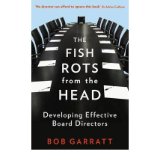
This brings together corporate governance, board structure and process, and strategic thinking with the world of organisational learning. It introduced the concept of The Learning Board and the now common phrase 'the fish rots from the head'. Now in its 14th year and going strongly!
Thin on Top: Why Corporate Governance Matters and How to Measure and Improve Board Performance by Bob Garratt (21 Mar 2003)

This is a strong argument for corporate governance to be the driving force for organisational success rather than just 'compliance'.
The Twelve Organizational Capabilities by Bob Garratt (2 Jan 2001)
.gif) This brings together a passionate argument for valuing people in an organisation with methods of adding systems thinking and quantification to the developmental processes.
This brings together a passionate argument for valuing people in an organisation with methods of adding systems thinking and quantification to the developmental processes.
Developing Strategic Thought: A Collection of the Best Thinking on Business Strategy by Bob Garratt (30 Oct 2003)
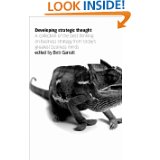
The first compilation of leading edge thought and practice in this misunderstood area. Includes essays by Henry Mintzberg, Max Boisot and Charles Hampden-Turner.
Developing Learning Leaders: Creating a Learning Climate in Your Organization by Bob Garratt (Mar 1990)
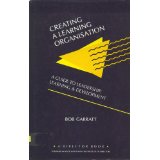
A special edition of "Learning to Lead".
Learning to Lead: Organizing Yourself and Others (The successful manager)by Bob Garratt (20 Feb 1995)
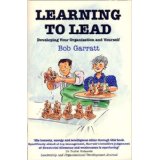
A leadership-focused follow-on from The Learning Organisation
The Learning Organization: Developing Democracy at Work by Bob Garratt (19 Jun 2000)
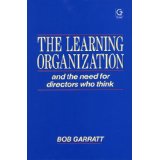 The first ever book on the Learning Organisation from encouragement by Charles Handy to write up experiences and thoughts from the GEC Developing Senior Managers Programme for Arnold Weinstock.
The first ever book on the Learning Organisation from encouragement by Charles Handy to write up experiences and thoughts from the GEC Developing Senior Managers Programme for Arnold Weinstock.
____________________________________________________________
Sally Garratt
Women Managing for the Millennium (Successful Manager) by Sally Garratt (18 May 1998)

The 1990s are proving a significant time of change in the world of management. As the new management philosophies of success emphasise co-operation, teamwork, motivation and encouragement (‘feminine’ qualities) rather than the old ways of command and control (‘masculine’ qualities), organisations are increasingly having to look at new ways of working. What do these changes mean for women in the workplace? In what ways are women’s methods more suitable than men’s to the new management style? How can women make the best use of their qualities and apply them successfully? Sally Garratt addresses all these issues and more in this practical, positive and forward-thinking guide. Women managers, trainers and HR directors will find Women Managing for the Millennium an invaluable book – illustrated with numerous case studies and packed with advice on how to capitalise on the new ‘co-operative’ ways or working in the organisations of today, and the future”.
Going it Alone: How to Survive and Thrive as an Independent Consultant by Sally Garratt (10 Nov 1994)
Are you thinking of launching out on your own as a consultant?
How do you tell if you’ve got what it takes to be the managing director and the receptionist?
Perhaps you’ve already started out on your own and could use the support and guidance of others who’ve been through the experience?
Sally Garratt has written candidly about the realities of setting up as a consultant, and the pleasures and pitfalls this has to offer, from her own personal experience. She offers detailed guidance on starting and building an 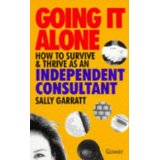 independent practice. Being an expert in your chosen field is just a beginning. What personal qualities will you need? How do you set about finding clients? When should you seek specialist advice? How can you balance work, home and leisure? For would-be consultants – and existing ones too – this is a complete guide”.
independent practice. Being an expert in your chosen field is just a beginning. What personal qualities will you need? How do you set about finding clients? When should you seek specialist advice? How can you balance work, home and leisure? For would-be consultants – and existing ones too – this is a complete guide”.
Manage Your Time (The successful manager) by Sally Garratt (Dec 1985)
Harper Collins
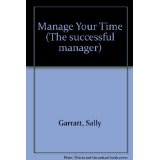
A fundamental text on Time Management and Personal Effectiveness
Calvert Markham
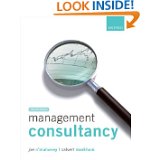
Management Consultancy {{ MANAGEMENT CONSULTANCY }} By Markham, Calvert ( AUTHOR) Mar-14-2013 by Calvert Markham (14 Mar 2013)
PLUS Kindle Edition
Practical Management Consultancy by Calvert Markham (18 Jun 2013)
.jpg)
The Top Consultant: Developing Your Skills for Greater Effectiveness by Calvert Markham (27 Aug 2004)
.jpg)
_________________________________________________________________
Vicky Pryce
http://www.amazon.co.uk/s/ref=nb_sb_noss?url=search-alias%3Dstripbooks&field-keywords=vicky+pryce

Prisonomics: Behind bars in Britain's failing prisons by Vicky Pryce (14 Oct 2013)
'Behind Bars in britain's failing prisons' digs beneath the figures to question the rationale for putting so many people in prison when crime has halved over the past two decades and argues that the direct and indirect economic costs of the prison system , particularly the unintended consequences of children separated from their families and the still large reoffending rate, render the prison system in England and Wales not 'fit for purpose'. It proposes alternatives, particularly for women, which are cheaper and more effective in cutting crime and the cost to society.
Greekonomics: The Euro crisis and why politicians don't get it by Vicky Pryce (14 Nov 2013)
'Why the EU Leaders Don't Get It' explores the problems faced by the eurozone and concludes that the crisis is by .jpg) no means over. The countries that make up the eurozone do not naturally form an optimal currency area and the support mechanisms were as they stood incapable of dealing with external shocks. The book suggests that Greece was just a symptom of the bad institutional framework for the crisis which then spread across most of the eurozone, and that far from being over the problems inherent in the eurozone, such as the banking crisis and the huge debt overhang, unless resolved decisively will keep the eurozone growth very low for years to come.
no means over. The countries that make up the eurozone do not naturally form an optimal currency area and the support mechanisms were as they stood incapable of dealing with external shocks. The book suggests that Greece was just a symptom of the bad institutional framework for the crisis which then spread across most of the eurozone, and that far from being over the problems inherent in the eurozone, such as the banking crisis and the huge debt overhang, unless resolved decisively will keep the eurozone growth very low for years to come.